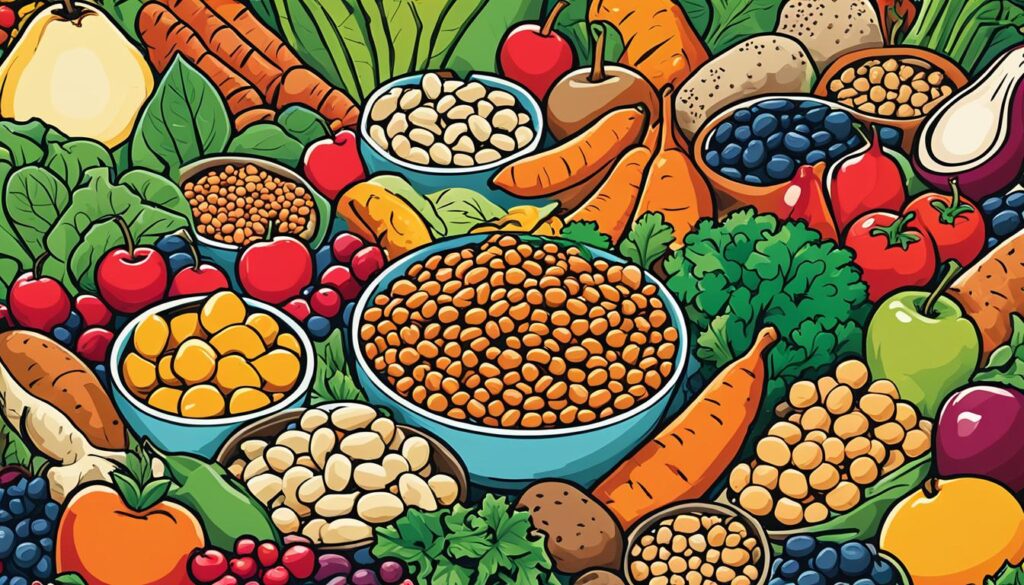If you’re dealing with constipation, you’re in good company. It’s a common issue that affects many people yearly. Factors like dehydration and stress can cause it. While medicines can help quickly, there are also natural ways to ease constipation.
Increasing fiber, drinking plenty of water, and exercising regularly can help. These methods offer a natural way to get your digestive system back on track.
Key Takeaways
- Constipation can be caused by dehydration, a low-fiber diet, stress, and health issues.
- Home remedies like more fiber, staying hydrated, and probiotics can help.
- Exercise and lifestyle changes can prevent and ease constipation.
- Medicines can offer quick relief but should be used carefully and with a doctor’s advice.
- With the right natural treatments and lifestyle changes, you can overcome constipation and keep your digestive system healthy.
What Causes Constipation?
Constipation is a common issue many people face. Knowing what causes it is the first step to finding relief. Your diet, lifestyle, and health can all play a role.
Common Causes of Constipation
Some top reasons for constipation are:
- Inadequate fiber intake – Fiber keeps your digestive system regular. Not having enough can lead to constipation.
- Dehydration – Not drinking enough water makes stool hard and hard to pass.
- Lack of physical activity – Exercise helps stimulate the digestive system and bowel movements.
- Stress and anxiety – Stress can mess with the normal digestion process.
- Certain medications – Some drugs can cause constipation as a side effect.
- Underlying health conditions – Issues like irritable bowel syndrome (IBS), diabetes, or thyroid problems can cause constipation.
Knowing what causes constipation helps you find relief. By fixing the underlying issues, you can improve your digestive health and regularity.
Increase Fiber Intake
Adding more high-fiber foods to your meals can really help with constipation. Fiber makes your stool bigger and helps it move better through your intestines. Try eating oats, whole grain breads and cereals, whole wheat pasta, fruits, vegetables, brown rice, beans, lentils, and nuts.
If you’re not getting enough fiber from food, you can try fiber supplements. Psyllium, methylcellulose, and calcium polycarbophil can help with bowel movements. But remember to add more fiber slowly to avoid feeling bloated.
High-Fiber Foods to Try
- Oats
- Whole grain breads and cereals
- Whole wheat pasta
- Fruits and vegetables (especially berries, pears, and leafy greens)
- Brown rice
- Beans and lentils
- Nuts and seeds

By eating more fiber-rich foods, you can help your digestive system work better. This can ease constipation and improve your health.
Stay Hydrated
Drinking enough water is key for regular bowel movements. Aim for at least 1.8 liters or 7-8 glasses of clear liquids daily. This amount can change based on your size, sex, and if you’re pregnant or nursing.
If you’re dealing with constipation and not drinking enough water, try a big glass of water. Sometimes, this can help start a bowel movement. Drinking water is crucial to prevent and ease constipation.
The Importance of Drinking Enough Water
The experts suggest at least 64 ounces of water for healthy bowel movements. Drinking enough water makes stool softer and helps waste move through your system. Staying hydrated helps prevent and fix constipation.

But the benefits of drinking water go beyond constipation relief. It’s vital for your overall health and well-being. Try to drink lots of water all day to keep your body working well.
Home Remedies For Constipation
Increasing your fiber intake and staying hydrated are key steps. But, there are also home remedies that can help. These can make your digestive system work better.
Drinking a glass of water is a simple way to help. Staying hydrated is crucial for healthy bowel movements. You might also consider fiber supplements or eating more fruits, veggies, and whole grains.
For some, laxative stimulants or osmotic laxatives can be helpful. These can ease constipation gently.
Using a lubricant or stool softener can make going to the bathroom easier. Some find relief with an enema or suppository. Sitting in a squatting position while on the toilet can also help.
- Drink a glass of water
- Take a fiber supplement
- Eat high-fiber foods
- Use a laxative stimulant or osmotic laxative
- Try a lubricant or stool softener
- Use an enema or suppository
- Get in a squatting position when using the toilet
Natural remedies like probiotics and herbal teas can also help. Gentle exercise and colonic massage might work for some. With these natural remedies, you can ease constipation without harsh laxatives.

Exercise and Lifestyle Changes
Making changes to your lifestyle can help a lot with constipation, besides diet. Regular exercise is a key way to keep your digestive system healthy and avoid constipation.
The Benefits of Regular Physical Activity
Doing some exercise, even just walking, can help your bowels work better. Experts say adults should aim for 150 minutes of activity each week for good bowel health.
- Regular exercise boosts blood flow and muscle contractions in the intestines, helping move stool along.
- It also lowers stress and anxiety, which can cause constipation.
- Being active supports your gut health and helps prevent chronic constipation.
Along with exercise, having a regular bathroom routine is key. Avoid holding in your stool to keep bowel movements regular and support healthy digestion.

By adding these lifestyle changes to your diet, you can better manage constipation and keep your digestive system healthy.
Constipation in Children and Pregnant Women
Constipation is a common issue for kids and pregnant people. Kids might have constipation if they don’t have a bowel movement more than two times a week. Drinking more water, staying active, and setting a regular toilet routine can help with constipation in kids. If it doesn’t get better or if there are other symptoms, seeing a doctor is a good idea.
Constipation during pregnancy is often seen in the third trimester and after giving birth. The American College of Obstetricians and Gynecologists suggest eating more fiber and using stool softeners if diet changes don’t help with treating constipation in special populations.
- Encourage children to drink more water and engage in regular physical activity to help prevent and manage constipation.
- Pregnant individuals can try increasing their fiber intake through diet or supplements to alleviate constipation during pregnancy.
- If dietary and lifestyle changes are not effective, it’s important to consult a healthcare provider for personalized advice on treating constipation in special populations.
When to Seek Medical Attention
If you’re dealing with constipation, home remedies and over-the-counter treatments might help. But, there are times when you should see a doctor. This is true if constipation lasts over a week and doesn’t get better with self-care.
If you’re feeling dizzy, tired, have severe stomach pain, or see bloody stool, it’s a sign you should get medical help. These symptoms could mean there’s a bigger health issue.
Seeing a doctor is also a good idea if you need laxatives often for constipation. Or if you haven’t had a bowel movement for several days. This shows you might need more serious help.
Don’t hesitate to get medical help if you notice any of these signs:
- Constipation that lasts more than a week
- Severe abdominal pain or discomfort
- Bloody or black stools
- Unexplained weight loss
- Chronic or severe constipation that requires regular laxative use
Your doctor can figure out why you have chronic or severe constipation. They can suggest treatments like diet changes, medicine, or other therapies. Getting medical help can bring relief and prevent serious problems.
Preventing Constipation
Keeping your gut healthy is key to avoiding constipation and keeping your digestive system in good shape. Simple changes in your daily life can help you stay regular and prevent constipation.
Maintaining a Healthy Gut
Supporting your gut health is a major step in preventing constipation. Eating foods high in fiber helps your bowels move regularly and keeps your gut healthy. Adding foods like yogurt or fermented veggies can also balance your gut bacteria, improving gut health and bowel function.
Drinking enough water is also vital for preventing constipation. It keeps your digestive system working right and stops dehydration, which makes stools hard and dry.
Regular exercise is another way to fight constipation. Activities like walking, swimming, or yoga can get your digestive system moving and help you stay regular.
By adding these changes to your daily life, you can lower your chances of getting constipated and keep your digestive system healthy.
Conclusion
This article has shared home remedies and natural treatments for constipation. By increasing fiber intake, drinking plenty of water, exercising, and using laxatives when needed, you can ease constipation. It’s important to prevent constipation by eating well, staying hydrated, and making lifestyle changes.
Sometimes, constipation happens and goes away on its own. But if it keeps happening or is very bad, you should see a doctor. These natural remedies and tips can help you manage your digestive health and find relief from constipation.
Everyone’s body is different, so what helps one person might not help another. Be patient and listen to your body. If your symptoms don’t get better or get worse, don’t hesitate to get medical advice. With the right approach, you can beat constipation and keep your digestive system healthy and comfortable.
FAQ
What causes constipation?
Constipation can come from dehydration, eating too little fiber, stress, or health issues.
What is the average whole gut transit range?
The average time for food to move through your gut is 10 to 73 hours. Exercise, diet, age, and sex can change how often you go to the bathroom.
What high-fiber foods can help relieve constipation?
Foods like oats, whole grain breads, and cereals can help. Also, whole wheat pasta, fruits, vegetables, brown rice, beans, lentils, and nuts are good choices.
How much water should you drink to stay hydrated?
Aim for at least 1.8 liters or 7-8 glasses of water a day. The amount you need can change based on your size, sex, and if you’re pregnant or nursing.
What other home remedies can help relieve constipation?
Try fiber supplements, eating more fiber, drinking water, or using laxatives. You can also try stool softeners, enemas, squatting, exercising, and colonic massage.
How does exercise and lifestyle affect constipation?
Exercise, like walking, can help your bowels move better. Adults should aim for 150 minutes of exercise weekly. Don’t hold in your stool and have a regular bathroom routine to help your bowels.
How can constipation be addressed in children and pregnant individuals?
Kids can benefit from more fluids, exercise, and a regular toilet routine. Pregnant women should eat more fiber and use stool softeners if needed.
When should you seek medical attention for constipation?
See a doctor if constipation lasts over a week or gets worse. If you have dizziness, fatigue, severe pain, or bloody stool, get medical help. Using laxatives often may also mean you should see a doctor.
How can you prevent constipation?
Eat a lot of fiber, drink plenty of water, exercise, and use probiotics. These steps can help prevent constipation and keep your digestive system healthy.
















Leave a Comment